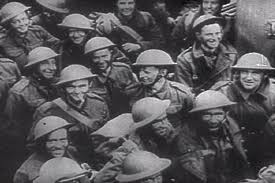


On one page of that site you will find, “Together, we are presenting a vibrant global Programme of cultural events and activities, online resources and digital platforms which will enable millions of people across the world to discover more about life in the First World War.” I wonder if it will be romantically portrayed or as the greatest human disaster in history? Or was that WW2? What is the truth?
In WW1 there were nearly 8 million deaths, nearly 22 million wounded and nearly 2 million missing. In the Second World War there were a little over 52 million civil and military deaths. Ooops! That puts the two conflicts in perspective. To put it further in perspective statistics tell us that 388,000 died in Britain, 500,000 from the USA, but 2M in Japan, 6.1M in Poland, 6.9M in Germany, 10M In China and 20.6M in the USSR! Some dispute those figures and say they are more but however you look at it, over 50million people died at a result of the conflict we call WW2. How can that figure make sense? It is like saying the entire population of the United Kingdom in the 1950s was being wiped out.
Now this is just playing with figures, so let’s add some more for us Silver Surfers. If you are 70 today (2013), you were 2 at the end of WW2. If you are 75 today, you were 7 then, if you are 85 today you were 17 then. Combatants in that conflict have got to be at least 85 today (give or take a year). We are rapidly running out of people who genuinely remember it or were part of it (you’ve probably got to be early 70’s to have memories of it.)
Remembrance is a good thing, it is said, for two main reasons: first, so that we will not forget the horrors of war and, second, so that we will honour those who fought in order that we might have the world we have today.
According to one internet quote, “Since the end of the Second World War in 1945 there
have been some 250 major wars in which over 50 million people have been killed, tens
of millions made homeless, and countless millions injured and bereaved.” As a nation
we have been involved in conflicts in the Falklands (1982), the Gulf (1990-
So how does one go about ‘remembering’? Well I guess there are a few of us who do still have our own memories of war. More of us will have memories of parents, uncles and aunts who were combatants in one way of another. With the awareness of ‘post traumatic stress syndrome’, observed in those who have returned from more recent conflicts, we perhaps wonder how many of those of our families who returned and survived WW2 were actually exhibiting signs of PTSS? Can anyone go through that without that sort of effect? Tales abound of those returning from the conflict, utterly different from what they were before it all. Well, for some of us, as we look back and wonder about our childhoods, maybe this understanding about what our parents did, went through and how they came out different, may explain things that happened to us, and the nature of our upbringing.
Until more recently I’m not sure Hollywood films did us any favours. The enormity of ‘The Longest Day’ or ‘The Battle of Britain’ leave many feeling it was just one big adventure. Whole streams of films glorified war and probably it was the advent of a certain Private Ryan that brought reality. I have tried to imagine the awfulness of the killing fields of WW1 but it just makes me angry, probably a defence mechanism to avoid tears. Crass stupidity are words that come to mind.
Issac Asimov is attributed with the quote, "war is the last resort of the incompetent",
but perhaps that is too simplistic. Perhaps that was more true of the First World
War, but Neville Chamberlain was deemed incompetent for trying to naively avoid it,
Hitler didn’t give us that choice. It is easy to pontificate from a distance but
serious question marks still hang over so many of these conflicts. Will long-
So here we are in this post-
But then we have a younger generation whose world is so staggeringly different from
that of seventy years ago, that talk of ‘the Wars’ is almost given less credibility
than super-
As my generation eventually will pass away (we may still have some time to go!), the generation of children whose parents participated in the last major conflict, will ‘remembrance’ become more linked simply with an interest in history? In recent years there has been a resurgence in nostalgia as many question the world that we have today and feel dissatisfied with it.
‘Vintage’ is a word that has taken on new meaning but I would guess that vintage, retro etc. etc., used in the younger generations, are associated with ‘nice feelings’ and these exclude Private Ryan type recollections of yesterday, i.e. modern cool culture is also cosy culture. Perhaps this is another reason why we need ‘remembrance’, to hold a balance of reality in life – life isn’t always nice and cosy and sometimes (as in the past) when bad men prevail good men have to take up arms and that is when the weeping starts.
If we haven’t lived through it, we probably know someone who has but, as we noted above, they are growing fewer by the day. If we didn’t go through it we have nevertheless perhaps been influenced in our lives by those who did, and at times that influence was not good, for war and its effects are not good. This is an area of our lives where there are no clever answers, just lots of questions about necessary evils, but it is part of the hidden background that makes us who we are, whether we liked it or not.
